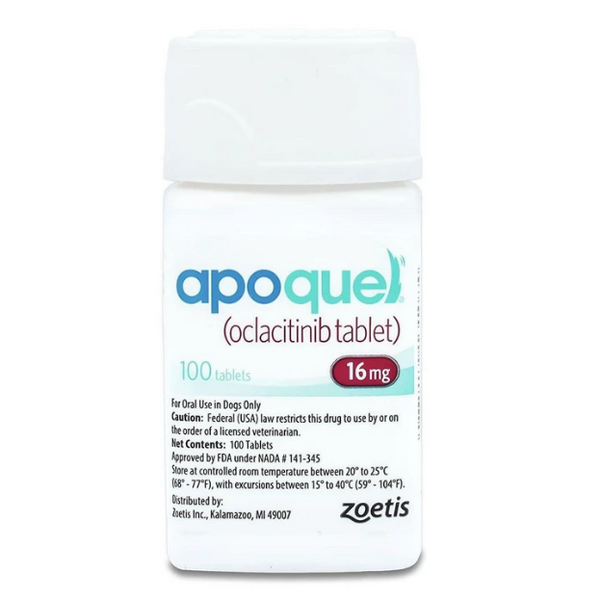Medically Reviewed by Taylor Froiland, PharmD, RPh
Written by Adam McCown, PharmD
Your dog’s a tough little guy or girl, but they can suffer from allergies just like the rest of us. And if you are one of the 50 million Americans who suffer from allergies every year, then you know how annoying, painful, and awful they can be. You understand how the constant itchiness, scratching, watery eyes, swollen eyes, sneezing, dry, scratchy throat, and all the other symptoms are no fun at all for anyone who suffers from them.
Well your four legged friend can suffer from these types of allergies as well. Although they are not quite as common in canines as they are in humans, the suffering they endure is no less severe if your dog is susceptible to them. What’s more is that if left untreated, your dog’s allergies or allergic reactions can cause serious related health issues.

Symptoms and Signs of Dog Allergies
It’s important that you as a dog owner can recognize the signs and symptoms of their allergies. You don’t want to confuse allergy symptoms with symptoms of the flu or other condition. You should look for signs of itching and irritation, typically in the form of redness, sensitivity, and inflammation. Monitor your dog’s behavior for more itching than normal.
Dogs will typically attempt to relieve the itch by scratching, licking, or chewing the irritated area. The most common areas affected by allergies are the face, ears, feet, belly, and armpit area. Where your dog is itching or scratching can also be a clue to the source of the allergen, so be sure to make note of the location your dog is itching to tell your vet when you bring them in.
Other signs and symptoms of dog allergies include:
- Hives
- Swelling of the face, ears, lips, eyelids, or earflaps
- Red, inflamed skin
- Diarrhea
- Vomiting
- Sneezing
- Itchy ears
- Chronic ear infections
- Itchy, runny eyes
- Constant licking
Types of Dog Allergies
There are different types of allergies your dog may be suffering from. Skin allergies, called allergic dermatitis, are the most common type of allergic reactions in dogs. They are typically caused by fleas and environmental allergens. Food allergies are not very common in dogs, but in the rare cases when your dog is allergic to a food, hives, facial swelling, itchiness, vomiting, and diarrhea can result. Most often, dogs merely have food sensitivities, no an allergy. Finally, your dog may suffer from an acute allergic reaction. Dogs, like people, can go into anaphylactic shock if they have a severe reaction to an allergen. This can be fatal if not treated.

Dog Allergies Treatment: Prevention
Just like with humans who suffer from allergies, the most effective dog allergy treatment is the elimination of triggers. In other words, do you best to prevent your dog from coming into contact with the things that they are allergic to. Key to this type of allergen prevention is keeping your dog clean and well groomed, washing them with anti-flea shampoo at least once a month.
However, it may or may not always be possible to prevent contact between your dog and specific allergens. In terms of treatment, it depends on your dog’s type of allergy. For example, the best way to treat flea allergy dermatitis is to kill the fleas, whereas the best way to treat a food allergy or food intolerance is a change in diet.
When it comes to canine atopy, preventing contact with the allergen can be very difficult. Canine atopy is a type of allergic reaction that results from exposure to airborne allergens, including pollen, mold spores, dust mites, and mildew. Additionally, some animals are allergic to natural fibers, household cleaners, or the dander of other household pets.
Dog Allergies Treatment: Medication
Similar to humans, medications are often the best and fastest way to bring symptom relief to your dog suffering from allergies. If prevention is not possible or not effective in your situation, your vet might prescribe steroids, antihistamines, cortisone, or immune-modulating drugs to subdue allergy symptoms. Allergy shots may also be effective, as they help the dog’s immune system develop resistance to offending allergens.
Even if prescribed allergy medication, it is still a good idea to limit your dog’s exposure to allergens and maintain hygiene as best as you can.
If your vet prescribes medication as a treatment for allergies in your dog, don’t forget that we can fulfill all your pet drug and medication needs conveniently and cheaply online at Express Vet Pharmacy. We are here to help both you and your four legged, furry friends!
Spotlight On: Apoquel
Apoquel tablets control itching associated with allergic dermatitis and control of atopic dermatitis in dogs at least 12 months of age. Apoquel tablets are not for use in breeding dogs, or pregnant or lactating bitches. Apoquel tablets is for oral use in dogs. Made by Zoetis.
Check it out here.







